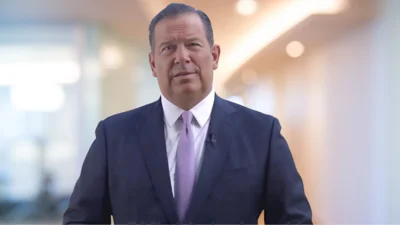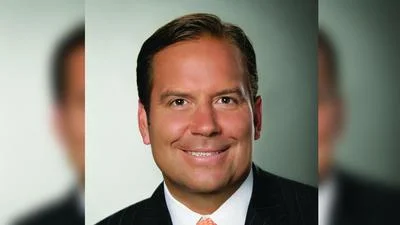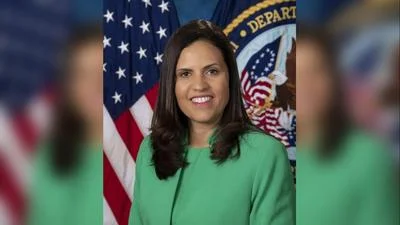U.S. Rep. Michael Bost (R-Ill.) | Official photo
U.S. Rep. Michael Bost (R-Ill.) | Official photo
The Supreme Court has agreed to hear a case challenging Illinois’ law that allows election officials to continue counting mail-in ballots up to two weeks after Election Day.
The appeal, filed by U.S. Rep. Michael Bost (R-Ill.) and two Republican presidential electors, questions whether the extended vote count deadline violates federal law that mandates a single national Election Day, and whether federal courts have jurisdiction to hear such challenges.
T. Russell Nobile, senior attorney with Judicial Watch and lead counsel on the case, detailed the group’s long battle to uphold what they argue is a clear federal mandate.

T. Russell Nobile, senior attorney with Judicial Watch.
| Judicial Watch
“Technically, we filed it in May of 2022, so that tells you how long we've been fighting this,” Nobile told Prairie State Wire. “The crux of the claim is that ballots coming in after Election Day violate the Election Day statutes.”
“Congress in 1845 set up a national Election Day, and for the better part of 180 years, everyone mandated ballots be in by Election Day. There have been a few tinkering with this here and there; they experimented with it once or twice, but for the most part, ballots were always due by Election Day.”
Oral arguments are expected during the Court’s next term beginning in October 2025, with a decision likely by mid-2026.
The outcome could set a key precedent on the balance of state and federal authority in federal elections and on candidates’ ability to challenge election laws in court.
According to the lawsuit, Bost claims late votes cause elections to be “diluted by illegal ballots received in violation of the federal Election Day statutes.”
Nobile emphasized the fundamental principle at stake.
“Ballots aren’t cast until they're received because they can be changed, withdrawn or canceled under most state practices,” he said. “By allowing ballots to come in after Election Day, the election is not concluded by Election Day.”
At the heart of the dispute is whether Bost and his co-plaintiffs have the right, or standing, to sue over the state’s mail ballot deadline.
“Congressman Boss and two electors sued over that, and it's been an unanswered question,” Nobile said. “This is a question that no federal court has ever actually resolved.”
The road to the U.S. Supreme Court has been a long one for Bost and his co-plaintiffs.
Lower courts thus far have ruled that the plaintiffs were not directly harmed by the law and therefore could not bring the case.
In July 2023, the district court dismissed the case for lack of jurisdiction, and the plaintiffs appealed the following month. The district court also denied the Illinois Democratic Party’s (IDP) motion to intervene in the lawsuit, a decision upheld on appeal.
In August 2024, the 7th Circuit affirmed the dismissal, leaving Illinois’ mail-in ballot deadline unchanged. However, one judge on the panel dissented, arguing that as a sitting congressman in an ongoing campaign, Bost had a legitimate interest in the law’s impact on federal elections and should have standing to challenge it.
Following the 7th Circuit ruling the plaintiffs filed a cert petition with the U.S. Supreme Court in November 2024, leading to the Court’s decision to hear the case.
Nobile noted that federal courts in Illinois have avoided addressing the merits of the case, instead narrowly ruling that Bost lacked standing to sue.
“The federal courts in Illinois took, frankly, the most narrow view of jurisdiction in the history of election law, and they refused to answer the merits of the case raised,” Nobile said. “So we've been waiting for an answer on our theory or our claim for literally three years now, roughly. The courts have basically avoided it. And now the Supreme Court is going to decide whether or not courts have jurisdiction to hear this claim.”
Nobile explained the broader implications of the Supreme Court ruling, which could clarify whether federal courts are open to hearing challenges from candidates on state election procedures.
“The question now really in Illinois is whether federal courts are open to hear candidate challenges to electoral procedures, because under their view of the rule, Bush v. Gore would have never happened, and a lot of these other famous campaign election disputes would never have been heard,” he said.
If the court sides with Judicial Watch, Nobile said it will open the door for federal courts to hear “good faith disputes over state electoral practices,” provided there is a federal hook.
He clarified that the case isn’t about banning early voting or mail ballots, but about requiring that ballots be received by election officials on Election Day itself.
“It doesn't mean you can't early vote, it doesn't mean you cannot mail your ballot, it just means that the ballot has to be received by election officials by Election Day,” Nobile said.
Judicial Watch President Tom Fitton framed the Supreme Court’s decision to hear the case as a critical moment to enforce federal election law and safeguard election integrity.
“The Supreme Court’s decision to hear this case is a critical opportunity to uphold federal law, protect voter rights, and ensure election integrity. Illinois’ 14-day extension of Election Day thwarts federal law, violates the civil rights of voters, and invites fraud,” Fitton said in a press release.
Nobile warned that allowing ballots to arrive after Election Day not only raises logistical concerns but also threatens public confidence in electoral outcomes.
“Actual fraud is so hard to prove and you have such a small period to do it that it's almost impossible to do in the post-election context,” Nobile said. “I mean, the problem with ballots coming in after Election Day is, you know, it undermines legitimately elected people and it's corrosive.”
He explained how late ballots complicate election transparency and undermine election integrity.
“If everyone votes by Election Day and they put their choice in a box, you may not have counted everything in that box by Election Day, but the choice has been made and you still gotta count,” Nobile said. “If the next week you still don't know how many ballots are in there, and it's really hard to monitor new ballots coming in, then it raises legitimate questions about how are these new ballots going in? And, you know, it's almost impossible to observe and monitor.”
Reflecting on the 2020 election, Nobile said federal courts’ refusal to hear timely election challenges likely eroded public confidence.
“I think it will have probably made people more confident in the 2020 elections if federal courts had been open to hear the claims and then dismiss them, right?” Nobile said. “I mean, that's part of the process of ensuring confidence in the election — that the courts hear challenges and explain the reasoning why they should be ignored or dismissed.”
Ultimately, Nobile stressed that election integrity transcends partisan preferences.
“I think that it's important to have not superficial confidence, but real confidence that the election and elected officials were duly elected,” he said. “And I think it's really corrosive to the democratic process when people, when practices are implemented that create a reasonable question about the electoral legitimacy.”
Judicial Watch has been active in pursuing similar cases across the country.
In Mississippi, the Fifth Circuit recently ruled in their favor against post-Election Day ballot counting.
The group has also filed lawsuits targeting election practices and voter roll maintenance in states including California, Oregon and Utah.






 Alerts Sign-up
Alerts Sign-up